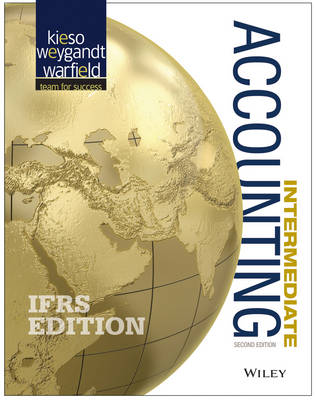Wiley Plus Products
4 primary works • 105 total works
Fundamentals of Intermediate Accounting, 2nd Edition WileyPLUS Card
by Terry D Warfield, Jerry J Weygandt, and Donald E Kieso
Wileyplus/Hs Stand-alone to Accompany Financial Accounting
by Paul D Kimmel, Jerry J Weygandt, and Donald E Kieso
Financial Accounting, 7E WileyPlus High School Card
by Jerry J Weygandt, Donald E Kieso, and Paul D Kimmel
(Wcs)Financial Accounting 4th Edition Binder Ready Without Binder with Clicker & Wiley Plus Set
by Paul D Kimmel
WileyPlus Hs Stand-alone to Accompany Financial Accounting, 6E
by Jerry J Weygandt, Donald E Kieso, and Paul D Kimmel
* A checklist at the beginning of each chapter, outlining text features and study skills needed
* A series of check boxes to prompt students to use the learning aids in the chapter, and set priorities while studying
* Accounting in Action and Technology in Action boxes give students glimpses into the real world of business-including Ethics Insights, International Insights, e-Business Insights, and Business Insights.
* Student and Instructor Approved Pedagogy includes marginal accounting equation analyses, and financial statements and ratio analysis throughout the text. The strategic use of color, photographs, and illustrations, rated #1 in instructor satisfaction.
* Infographics -- These memorable visual reminders help students visualize and apply accounting concepts to the real world.
* Unparalleled Readability -- Students using Accounting Principles rated their text "easy to read" more frequently than students using other accounting principles textbooks. The new edition continues to reflect this conversational style and highly rated clarity.
* Useful, Thought-Provoking End-of-Chapter Material -- including Self-Study Questions, Questions, Brief Exercises, Exercises, A & B Problem Sets and Broadening Your Perspective which is divided into two sections:
* Financial Reporting and Analysis -- includes financial reporting problems, comparative analysis problems, Interpreting Financial Statements: A Global Focus, and Exploring the Web exercises.
* Critical Thinking -- includes Group Decision Case, Communication Activity, and Ethics Case.
Managerial Accounting, (Wpis)
by Jerry J Weygandt, Donald E Kieso, Paul D Kimmel, and Ibrahim M Aly
Intermediate Accounting, Fifteenth Edition WileyPlus Student Package
by Donald E Kieso, Jerry J Weygandt, and Terry D Warfield
WileyPLUS Stand-alone to accompany Intermediate Accounting
by Terry D Warfield, Jerry J Weygandt, and Donald E Kieso
Intermediate Accounting: Ifrs Edition 2e + Wileyplus Registration Card
by Donald E Kieso, Jerry J Weygandt, and Terry D Warfield
WileyPLUS Stand-Alone to Accompany Financial Accounting
by Paul D Kimmel, Jerry J Weygandt, and Donald E Kieso
(wcs)Financial 3rd Edition with Annual Report, Study Tips & Egrade Plus Set
by Paul D Kimmel
(wcs)Financial Accounting 3rd Edition, Take Action CD, Webct, Egrade, Working Papers and Study Tips Set
by Paul D Kimmel

